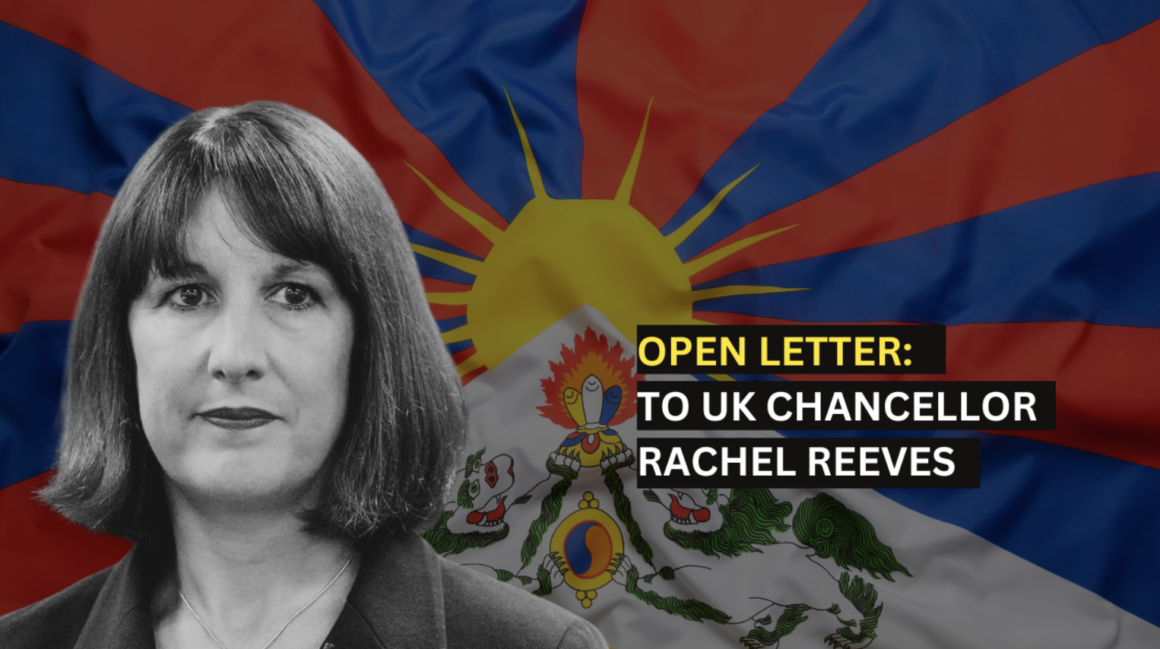Open Letter: To UK Chancellor Rachel Reeves
Rt Hon Rachel Reeves MP
Chancellor of the Exchequer
11 Downing Street
London SW1A 2AB
9 January 2024
Dear Chancellor,
We are writing to you on behalf of UK-based Tibet groups and thousands of Tibetans living in the UK. As you prepare to travel to China, we urge you to ensure that trade and access to Chinese markets do not take precedence over the rights of the Tibetan people, and for you to use bilateral meetings with Vice-Premier He Lifeng to raise the sharply deteriorating situation in Tibet.
Your meeting takes place at a historic low point for human rights in Tibet as the Chinese government increases its control in Tibet and imposes policies that have been criticised by international governments and United Nations human rights experts, including mass displacement and destruction of Tibetan heritage to make way for megadevelopment projects, and policies that might amount to forced labour. The UK government must ensure that it does not shy away from pressing Beijing over these human rights violations and that, in its attempts to revitalise economic ties, it does not risk becoming complicit in them by staying silent.
The threats to Tibet are diverse and affect Tibetans from every age and of every background. Over a million Tibetan children, as young as four years old, have been separated from their families and placed in residential boarding schools (1). At the same time, at least 2 million rural Tibetans, including farmers and nomads, have been relocated from their pastures in recent decades. These relocations are routinely coercive and result in marginalisation of nomads and the loss of livelihoods, while the total figure is almost certainly a drastic undercount. Many of those displaced have been placed into China’s coercive labour transfer and vocational training programmes, which are eradicating Tibetans’ traditional way of life and have been identified by United Nations human rights experts as possibly amounting to forced labour and a pretext “to undermine Tibet’s religion, language and culture, and to monitor and politically indoctrinate Tibetans” (2).
A further major threat to Tibet comes from extensive megadevelopment projects such as hydropower dams on Tibetan rivers and unregulated mining. As reported by BBC in December 2024, these massive hydropower dams are backed by international investors and risk displacing thousands of Tibetans, wiping out monasteries and entire villages while tightening China’s control over Tibetan territory and natural resources (3).
As an occupied people living under constant surveillance, Tibetans have no say in whether these projects take place, and those who report or challenge them are arbitrarily detained and imprisoned, such as Tsongon Tsering, sentenced to prison in 2024 for reporting illegal mining (4). The exploitation of Tibet’s environment and the harm being caused to lives and livelihoods has prompted Tibetans around the world to call for an international moratorium on megadevelopment inside Tibet last year (5). The UK must support these calls and avoid undermining them by seeking trade without tying it to improvements in China’s human rights record.
We recognise that this meeting is a pivotal step in determining the future relationship between the new UK government and China. As such, it must be conducted between two equal partners willing to hold open and frank exchanges. Raising the serious and unacceptable abuses in occupied Tibet by the Chinese government, and challenging China’s attempts to undermine the international human rights system, are paramount and will send a clear signal to the Chinese leadership that the UK is prepared to speak up for human rights even as it negotiates its future trade relationship with China, setting a crucial precedent for other countries to follow. The absence of such steps will be tantamount to granting impunity to those responsible for systematic human rights violations.
Trade and human rights do not have to be in competition, but, without a robust challenge to the Chinese government’s policies in Tibet, the UK’s attempts to prioritise trade risk returning it to the failed policies of the so-called “Golden Era” of the 2010s, when the human rights situation in Tibet sharply deteriorated. The UK also risks isolating itself from international partners, alert to the threats that Beijing’s policies pose in Tibet and beyond.
As one of China’s key trading partners, the UK retains a crucial influence on Beijing. We urge that you take this important opportunity to raise Tibet and human rights in the strongest possible terms with Chinese Communist Party leaders and to say that you have done so publicly. Engaging in self-censorship, hoping that this may secure short-term benefits in the bilateral relationship, undermines the UK’s core values and democratic principles. Upon conclusion of your visit, we also urge you to meet with Tibet group representatives and members of the Tibetan community.
We also call your attention to the recent devastating earthquake in Tibet that has resulted in at least 126 deaths and thousands of homes being destroyed highlighting the urgent need for unfettered access to the region. China’s restrictions on access and aid to Tibet are exacerbating the humanitarian crisis. We urge you to press Chinese leaders to lift these restrictions immediately, and allow international access and assistance to those affected by the earthquake, without interference or obstruction.
Looking ahead, we appeal to the UK government to prioritise the development of a more robust policy on Tibet, that engages with other concerned governments, to collectively address China’s flawed policies so that the Tibetan people’s aspirations for freedom and basic human rights can be realised. Together, you and other government leaders are uniquely positioned to exercise strong and direct influence on China’s leadership. By speaking and acting in unison, you will not only increase your influence over Beijing, but this common approach will provide participating governments with a greater measure of protection from China’s efforts to impose its authoritarian influence on our democracies.
These meetings with Chinese officials are a critical opportunity to speak out on Tibet and challenge China over its human rights abuses, and for the UK to develop a holistic China policy that does not abandon human rights, nor trade with China, but ties them together and puts the UK on equal terms with Beijing. Should you take this approach, you will show that this Labour government can be a positive force for change and an example for other governments to follow.
Yours sincerely,
| John Jones Free Tibet |
Pema Yoko Tibet Action Institute |
Eleanor Byrne-Rosengren Tibet Solidarity |
| Namgyal Samuels Students for a Free Tibet |
Rashi Jauhri International Tibet Network |
Tara Lhamo Volunteer Tibet Advocacy Group UK |
Further information
- ‘China: UN experts alarmed by separation of 1 million Tibetan children from families and forced assimilation at residential school’s, Office of the High Commissioner for Human Rights, February 2023 www.ohchr.org/en/press-releases/2023/02/china-un-experts-alarmed-separation-1-million-tibetan-children-families-and
- ‘Mass relocations continue: 17,000 Tibetans to leave homes by August’, International Campaign for Tibet, July 2022 savetibet.org/mass-relocations-continue-17000-tibetans-to-leave-homes-by-augus
- “Educate the Masses to Change Their Minds” China’s Forced Relocation of Rural Tibetans, Human Rights Watch, 2024 www.hrw.org/report/2024/05/22/educate-masses-change-their-minds/chinas-forced-relocation-rural-tibetans ; ‘China: “Vocational training” programmes threaten Tibetan identity, carry risk of forced labour, say UN experts’, Office of the High Commissioner for Human Rights, April 2023 https://www.ohchr.org/en/press-releases/2023/04/china-vocational-training-programmes-threaten-tibetan-identity-carry-risk
- ‘A dam ignited rare Tibetan protests. They ended in beatings and arrests, BBC finds’, BBC News, December 2024 www.bbc.co.uk/news/articles/c1d37zg1549o ; ‘China to build world’s largest hydropower dam in Tibet’, BBC News, December 2024 www.bbc.co.uk/news/articles/crmn127kmr4o
- ‘Tibetan Real-Name Complainant Detained by Chinese Authorities for Exposing Illegal Mining in Tibet’, Tibetan Center for Human Rights and Democracy, November 2024 tchrd.org/tibetan-real-name-complainant-detained-by-chinese-authorities-for-exposing-illegal-mining-in-tibet
- The moratorium can be found here https://tibetmoratorium.org. It has been reported in BBC News: www.bbc.co.uk/news/articles/c1d37zg1549o
- GEOGRAPHICAL NOTE: ‘Tibet’ refers to the three Tibetan provinces of Amdo, Kham and U-Tsang. In the 1960s, the Chinese government split Tibet into new administrative divisions: the Tibetan Autonomous Region (TAR), and Tibetan Autonomous Prefectures within Qinghai, Gansu, Sichuan and Yunnan Provinces. When the Chinese government references Tibet, it is referring to the TAR





Leave a Reply